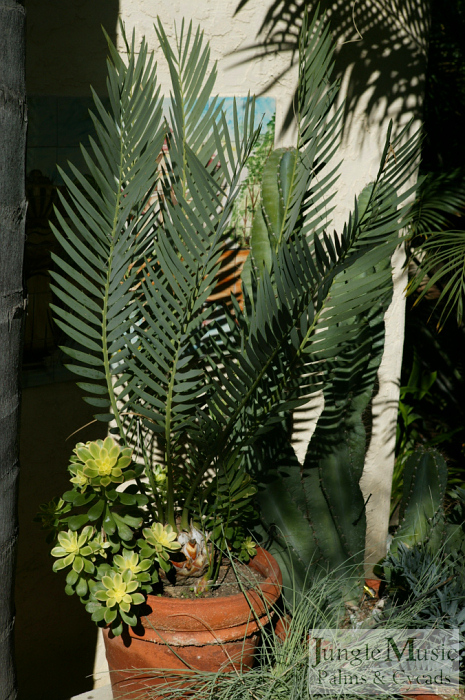OTHER CYCAD FEATURES
|
%20(Custom)%20(2).JPG)

%20(Custom).JPG)

|
ENCEPHALARTOS
DYERIANUS
Locality: This species has an
extremely small distribution in the Limpopo Province,
South Africa. It is only found on one granite
hillside, and is close to extinction. Local
government is not taking painstaking measures to protect
this and other species in the region. The climate
is hot and the grassland terrain is rough and rocky.
They can experience cold or freezing temperatures during
the winter months.
Plant Size: This
is a medium sized plant, but is one of the larger
Transvaal species. Leaves get one and a half to
almost two meters in length and the stems can reach
heights of over six meters of the centuries.
Encephalartos dyerianus tends to be a solitary
stemmed species, though it can produce basal suckers
infrequently.
Other Characteristics:
This is a beautiful blue species, which gets long
twisted/semi-twisted leaves. The species was named
after Allen Dyer, a prominent researcher in South
African cycads. E. dyerianus leaves vary
in color from a yellow blue to a powdery silver
depending on soil content, culture and exposure.
It is a moderate grower, but flushes regularly and bear
a full crown of leaves. The petioles and leaflets
are armed with sharp spines. The crown of leaves
on the species tend to be semi-erect, but can lay down
as the crowns become more full (especially on larger
specimens). The female cones on this species are a
bluish green, where the male cones are a bluish yellow.
Culture: In
coastal and inland areas, this species prefers to be in
full sun, but can tolerate some shade. For desert
areas, this species should be placed in partial sun or
filtered light. This plant does need a soil that
drains well, and does not do well with excessive
moisture. I would recommend mounding this plant so
as to avoid rotting issues.
Landscape Usage:
As with all the Transvaal species, I would give this
species a special spot in the garden. It should be
viewed and appreciated by anyone viewing the garden.
Not only are they striking in their appearance, but they
are very rare to come by. Most people in the know
would love to see specimens in person!
Availability: We
occasionally have this species available for sale.
It is one of the more difficult cycad species to find
for sale.
If you seek one, the best thing to do is to email us and
let you know you are interested in this species.
When available, this species sells extremely fast.
Pricing:
Encephalartos dyerianus is not only extremely rare and
hard to find - but, when you do find one, they tend to
be quite expensive. However, we do, on occasion,
get some plants into the nursery.
|

%20(Custom).JPG) |
|


![]()







